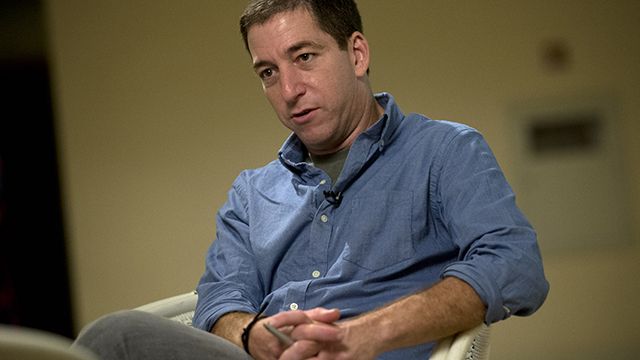
Edward Snowden’s leaks, the first of which were published in early June, have launched a hearty debate about the oversight of government surveillance programs. The debate has forced the president to announce (what many see as timid) reforms. Meanwhile, journalist Glenn Greenwald has continued to publish new stories based on Snowden’s documents that allege ever-greater levels of domestic spying by government entities. Here are some highlights from the discussion around the extent of government surveillance and the role of whistleblowers and leakers in our democracy.
In interviews with Edward Snowden, documentary filmmaker Laura Poitras and journalist Glenn Greenwald, Maass tracks in great detail the events that led up to their meeting in Hong Kong — during which Snowden was interviewed for days by Poitras and Greenwald — and the relationship between the three as Greenwald continued to break stories, Poitras continued work on a documentary about the NSA and Snowden fled to Russia. Maass writes that Greenwald, at first, was skeptical of Snowden and did not reply to his emails. It was Poitras who brought Greenwald to the story. “Their work was organized like an intelligence operation, with Poitras as the mastermind,” Maass writes. “Operational security — she dictated all of that,” Greenwald told Maass. “None of this would have happened with anything near the efficacy and impact it did, had she not been working with me in every sense and really taking the lead in coordinating most of it.” Read more »
Also worth reading is Maass’ Q&A with Edward Snowden.
Jay Rosen at his PressThink blog on the establishment’s schizophrenic reaction to Snowden’s leaks:
Rosen uses a moment on Piers Morgan’s program as a jumping off point to discuss the leaks that both the administration and the mainstream media simultaneously condemn and like to talk about in great detail. He writes, “Jeffrey Toobin of The New Yorker said that public discussion about previously classified materials was ‘a good thing’ but he still thought Edward Snowden was a criminal and shouldn’t have done what he did, [New York Times reporter James] Risen interrupted: ‘We wouldn’t be having this discussion if it wasn’t for him,’ he said. ‘That’s the thing I don’t understand about the climate in Washington these days… people want to have debates on television and elsewhere, but then you want to throw the people who start the debates in jail.'” Rosen goes on to raise the question that he finds most interesting in the whole Snowden affair: “Can there even be an informed public and consent-of-the-governed for decisions about electronic surveillance, or have we put those principles aside so that the state can have its freedom to maneuver?” Read more »
Rosen also has a post this week on what Jeff Bezos’ purchase of the Washington Post means for would-be leakers, whistleblowers and truth-to-power speakers.
Glenn Greenwald in The Guardian on the shift in public opinion that has resulted from his work:
In a video released by The Guardian shortly after his first leaks were published, Snowden said, “The greatest fear that I have regarding the outcome for America of these disclosures is that nothing will change. People will see in the media all of these disclosures. […] But they won’t be willing to take the risks necessary to stand up and fight to change things to force their representatives to actually take a stand in their interests.” Greenwald writes about a recent Pew poll showing that for the first time since 9/11, Americans are more concerned about civil liberties than terrorism. “For anyone who spent the post-9/11 years defending core liberties against assaults relentlessly perpetrated in the name of terrorism, polling data like [Pew’s] is nothing short of shocking,” Greenwald writes. Read more »
Economist blogger R.M. on the irony of Obama’s NSA reform press conference:
“There was something surreal, in a Kafkaesque sort of way, about Barack Obama’s press conference on August 9. Aiming to ease concern over the government’s surveillance programmes, the president announced reforms that seem both obvious and overdue. Then he criticised the man whose actions set those reforms in motion,” R.M. writes. “Mr. Obama conceded that those leaks triggered a passionate and welcome debate about American snooping. But the president said Mr. Snowden is no patriot. ‘I actually think we would have gotten to the same place [without Mr. Snowden’s leaks],’ Mr. Obama added, ‘and we would have done so without putting at risk our national security’.” But R.M. points out that Obama’s claim seems unlikely: “when senators asked for details about the breadth of NSA surveillance, they were stonewalled by the administration. When the director of national intelligence, James Clapper, was asked if the NSA collected ‘any type of data at all’ on a large number of Americans, he simply lied.” Read more »
Conor Friedersdorf at The Atlantic on Obama’s surveillance speech:
Writing about the same press conference, Friedersdorf says that Obama’s attitude was condescending, and made him feel as if the president was a parent addressing “precocious children. He proceeded as if widespread objections to his policies can be dispatched like a parent answers an eight year old who has formally protested her bedtime. He is so proud that we’ve matured enough to take an interest in our civil liberties!” But the most objectionable part of the president’s remarks, Friedersdorf argues, was not the tone, but the spin. “The disinformation should bother the American people most,” he writes, and goes on to pick apart numerous statements made in the speech. The speech, he says, was a “low point” in the Obama presidency. Read more »

